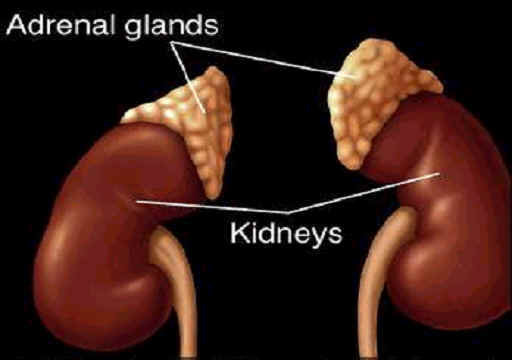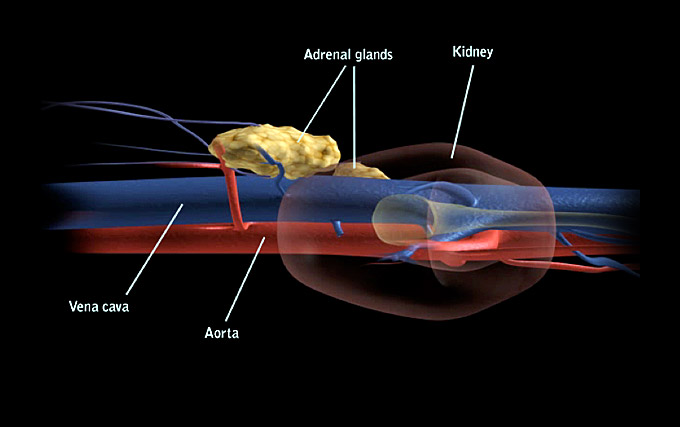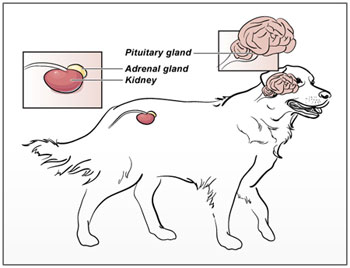On This Page:
An introduction and discussion about Addison's Disease which is also known as hypo-adrenocorticism,
or adrenal gland insufficency.
About Other Metabolic Diseases On Other Pages:
Diseases of the Spleen
Bone Marrow Diseases
Immune Mediated Disease
Sex Hormone Diseases
There are two major forms of Addison’s disease:
1. primary
2. secondary
Primary Addison’s is when the adrenal glands are unable to produce normal amounts of cortisol and other types of natural steroids needed for normal body function.
The most common reason for this is due to immune mediated damage to the glands.
Secondary Addison's disease is from failure of the pituitary gland in the brain to make a hormone called ACTH.
In normal patients, ACTH (adreno-corticotropic hormone) is used by the brain to regulate how much cortisol and other hormones are produced by the adrenal glands.
You will probably remember that adrenaline is part of the "fight or flight" process.
When in danger or action mode, our pituitary gland in the brain releases a lot of ACTH which stimulates the adrenal glands to release a lot of adrenaline and cortisol into the blood stream which turns down cell metabolism in organs systems not needed immediately for survival such as the GI tract, and over stimulates those organs needed for action such as the heart and muscles.
But, if there's something wrong with the pituitary gland (usually cancer), then either too little ACTH is produced causing Addison's disease or too much ACTH is produced causing Cushing's disease.
In Primary Addison's disease, the part of the adrenal glands that produce cortical steroids is diseased and not functioning well.
There may be no clinical signs of disease until 90% of the adrenal cortex has ceased to function.
The usual cause of the destruction of the adrenal glands is thought to be auto-immune...
for reasons we don't understand well,
the body's immune system attacks it own cells.
This occurs in other organs as well. In fact, many of our diseases are auto-immune type problems.
Another possible cause of Addison's Disease is from long term steroid therapy.
Another medication called Lysodren can also cause Addison's disease as a side effect.
Once we suspect your pet has Addison's Disease, there is no simple, cheap, in-clinic test to prove it, which is a nuisance, but there is a fairly straight forward test called an ACTH Stimulation test that is definitive.
ACTH will stimulate a normal adrenal gland to produce alot of cortisol. If very little cortisol is produced, then we know for certain that your pet has Primary Adrenal Gland Disease.
Once a certain diagnosis is made, then life long treatment will be needed
Website Directory
"What To Expect When You Go To The Vet"
if your pet should have a problem with ...
To include Femoral Head Removal, Hip Dysplasia, Anterior Cruciate Ligament Injuries, Panosteitis, Radiographic Demonstrations, Disc Disease, and Bone Surgery
Strokes, Vascular Diseases, Anemias, DVT, DIC, Blood Parasites, Rat Poison, & Bleeding disorders
Cardiology Heart disease in Cats, Cardiac Hypertrophy, Valvular disease, Cardiac Insufficiency, Congestive Heart Failure, Heartworm Disease, and a little history about the milestones in treating heart disease
Cats: general information page and directory of diseases and problems specific to cats including vaccine recommendations, leukemia, feline viral infections, feline upper respiratory disease and cats that just aren't feeling well.
Dermatology: Skin problems including allergies, rashes, bacterial infections, and itching. Hair Loss, Yeast Infections, Hormonal Problems
Heart disease; Cardiac diseases, vascular diseases, stroke, & heartworms
Hormone Diseases: Diabetes, Thyroid Disease, Cushing's Disease or Hypercortisolism, Addison's disease or Hypocortisolism, Pancreatitis, obesity as a disease
Infectious Diseases Colds, Distemper, Parvo, Leptospirosis, Bruceellosis, Panleukopenia, Feline AIDS, Leukemia, Hepatitis, Kennel Cough, Ringworm, Rabies, FIP, Canine Herpes, Toxic Shock Syndrome, & More
Intestinal problems: diarrhea, constipation, torsion, indigestion, and gas. Also pancreatitis, vomiting, esophagitis, colitis, parvo and other types of dysentery
Metabolic Diseases: Diabetes, Thyroid Disease, Cushing's Disease or Hypercortisolism, Addison's disease or Hypocortisolism, Pancreatitis, obesity as a disease
Parasite Problems Fleas, Ticks, Heartworms, Intestinal Worms, Mosquitos, Lice, Mites, and other welfare recipients
Poisons Snakes, Insects, household chemicals, plants, and foods that might poison your pet
Skeletal-Muscular Problems Arthritis, Fractures, ACL, Ligament Injuries, Disc Disease, Pannus, and many other problems of the bones, muscles, tendons, and ligaments
Skin Problems: allergies, rashes, bacterial infections, and itching. Hair Loss, Yeast Infections, Hormonal Problems
Surgery: Spays, Castrations, Testicle Recipes, Soft Tissue Surgery, Hard Tissue Surgery (Bones), C- Sections, Declawing, Tumor Removal and Cancer Surgery
Other Topics on This Site
Zoonotics: Diseases, worms, and parasites people get from pets.
Includes information about Prescription diets used to treat disease, and a discussion about the pet food industry
Includes information about feline and canine heat or estrus, breeding, C-Sections, pyometra or Infected Uterus, dystocia, no milk, mastitis, & brucellosis
Also newborn care, undescended testicles, and alternative to spaying and castration
WildLife Page: Taking care of baby bunnies, squirrels, and birds. A very funny story about beavers, and other misc information
Our Dog Page: a directory of problems of concern in dogs including parvovirus, distemper, canine herpes, and other diseases
Addison's disease is when the adrenal glands produce inadequate levels of hormones. And that is what this page is about.
Basic Intro: The two adrenal glands in mammals are small but critical little organs located near the top of the kidneys sharing both the protective pad of fat tissue around each kidney and the rich blood supply the normally goes to the kidneys.
The adrenal glands produce steroidal hormones that we need for normal body functions. These include:
Epinephrine or Adrenaline which regulate our metabolism and when needed, our "fight or flight" response for survival or intense action.
Norepinephrine which regulates heart rate and nerve transmissions and is also involved in the "fight or flight" response.
Aldosterone which regulates the critical relationship between Na (sodium) and K (potassium) surrounding our cells.
Cortisol: Cortisol is one of the major hormones used by the body as a Drill Sergeant to tell most of the other organs when to do what and how high.
It regulates our sleep patterns or diurnal variation, our stress levels, our blood sugar levels and is associated with our reactions to pain, fear, trauma, and changes in temperature.
Cortisol affects our immune system and response to infection and inflammation.
It affects blood pressure, urine output and much more.
It's a building block molecule for other homones such as testosterone and estrogen which are also produced by the adrenal glands (most of the testosterone and estrogen or other sex hormones are made by the testicles or ovaries).
Some Basics:
There are two major parts to the adrenal glands.
The inside tissue is called the medulla and produces the water based hormones like aldosterone that affect sodium and potassium levels. The medulla is more or less independent of the outer layer or cortex of the adrenal glands.
The outer layer of the adrenal gland is called the Cortex and produces fat or cholesterol based hormones like cortisol. Unlike the medulla, this tissue is regulated by the pituitary gland in the brain which in turn is regulated by the hypothalamus portion of the brain. This distinction is important because if anything happens to the brain, the result can affect the adrenal glands.
Because the adrenal glands produce hormones that are so important to the functions of our cells and organs, you can see how any problems ... whether caused by brain disease or direct disease to the adrenal glands can really make you sick. And since the hormones produced by these glands affect every cell in our bodies, you can see that we're likely to get a wide range of symptoms when things go wrong.
Which brings us to a short discussion of symptoms associated with Addison's disease.
Symptoms:
We vets often miss this disease because the symptoms are vague...just not feeling well, off and on digestive and intestinal problems, weakness, and so forth. Poor body condition, dehydration, a weak pulse, a slow heart rate, and blood in the stools are other common signs, but that's true of a lot of diseases. And the signs often come and go over a long period of time.
****One of the big hints that your pet may have Addison's is that it gets sick fairly often, but everytime the vet gives it fluids and/or steroids, it gets better for a while.
Often, it's not until the patient is critically ill that blood work is done and we diagnose the disease. This is yet another example of why performing routine blood work on sick animals is beneficial: we can diagnose these types of problems before they become an emergency.
Routine blood work may indicate: anemia, electrolyte imbalances (elevated potassium, low sodium, and low chloride), low blood sugar, elevated calcium, acidosis, and elevation of liver and kidney values. Once we get suspcious, further blood work can confirm the disease.
Any age dog can get this disease, but it tends to be seen in middle aged female dogs. Especially female dogs that haven't been spayed. About one third of cases are mixed-breed dogs, but there appears to be some breed predilection toward Poodles, Portuguese water dogs, Great Danes, Sheperds, and Rottweilers.
Treatment:
There is no "cure", but with treatment, (life long) most pets live a pretty normal life. The drugs most commonly used to treat Addison's disease are some combination of prednisone, Florinef, and DOCP. All of these are steroids used to replace the natural steroids no longer being produced by the adrenal glands.
We need to monitor your dog's blood on a regular basis so we can adjust the doses of these medications as needed. All three of these medications frequently cause mildly troublesome side effects, so we often have to deal with those. We refer to this process as "careful management" .
Approximately 35% of dogs with this disease present in what is known as Addisonian crisis; this is a true emergency and immediate treatment is required to save the dog's life. These animals have the classic signs of shock: mental dullness, pale mucous membranes, weak pulses, and cold extremities. In addition, they have an abnormally slow heart rate due to elevated blood potassium levels.
Inital treatment of a dog in suspected "Crisis" is lots of IV Fluids and high dose steroid injections. Your vet will do everything he or she can to get the body temperature up to normal and treat the other secondary problems associated with a patient in shock.
At the same time, expect a lot of testing to be done to confirm the suspected diagnosis and to look for other problems. These dogs that are in Addisonian Crisis are rapidly dying and we need to rule out heart failure, toxic shock, poisoning and other causes of weak, cold, slow heart rate, emergency patients.
Once the patient is stablized, treatment involves replacing synthetically the hormones a healthy adrenal gland would produce. Since the adrenal gland produces two major types of steroid hormones (cortical or gluco-corticoid and mineral-corticoid) we usually treat this disease successfully by giving prednisone (inexpensive and readily available) and either fludrocortisone (Florinef) orally or a once a month injection of DOCP (Percorten-V) These last two meds are a little expensive and your vet may not keep them on hand.
It's not quite as easy as I make it sound; like diabetes, it takes repeat testing, trial and error, and frequent adjustments in the medication to get everything just right so that your dog can lead a long and comfortable life.







